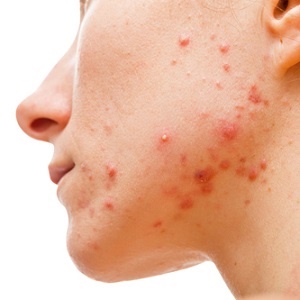
Acne is the most common skin disorder. It is a chronic inflammatory disease of the sebaceous hair follicles. Each follicle contains a fine hair and many sebaceous glands (the skin’s oil glands).
Under normal circumstances, sebum, the oily substance made by the sebaceous glands, travels up the hair follicle and out to the skin’s surface. However, with acne, sebum is trapped within the follicle and skin bacteria multiply within the clogged pores. Acne develops on those areas of the skin where sebaceous glands are most numerous: the face, scalp, neck, chest, back, and upper arms and shoulders.
Q: Do teens alone get acne?
A: No. Rarely, babies are born with acne and some people get acne for the first time after they’ve reached adulthood. Most people outgrow acne; but in women it may last until the menopause.
Q: How many people have acne?
A: Acne is the most common skin disease and affects about 90% of all teenagers. Acne in babies is uncommon and some people develop acne for the first time after they have reached adulthood. 5% of women older than 40 may still be troubled by acne. Only 1% of men in a similar age group have acne.
Q: What can make acne worse?
A: Some of the factors are:
- Changing hormone levels in adolescent girls and adult women two to seven days before their menstrual period starts
- Friction caused by leaning on or rubbing the skin
- Pressure from bike helmets, backpacks, or tight collars
- Environmental irritants, such as pollution and high humidity
- Squeezing or picking at blemishes
- Hard scrubbing of the skin
Q: How often should I clean my skin?
A: Hand wash skin twice a day with a mild soap, pat dry, and use appropriate acne treatment. Remember that acne is not caused by dirt or surface oil.
Q: Effect of other medication?
A: Yes. Many medicines, especially corticosteroids and anti-epilepsy drugs, can aggravate your acne. If you think a drug is making your acne worse, never stop taking it without discussing it with your doctor first.
Q: Can the sun improve acne?
A: There is no evidence that sunlight improves acne. Sunlight can do more harm than good as it leads to early ageing and increases your risk of skin cancer. Many medications used to treat acne can actually make your skin more sensitive to ultraviolet light. Rather follow one of the many proven treatment programmes.
Q: Does sweating and humidity make acne worse?
A: Both of these can make acne worse - for the same reason. Both sweating and humidity can cause hydration and swelling of the ductal blockages, which can precipitate the inflammatory phase of acne.
Q: What if I forget my medication?
A: An easy way to remember to take your medication, is to associate it with a routine daily event such as brushing your teeth. Keep your medication next to your toothbrush or on the breakfast table.
Q: Who should I see to treat acne?
A: A good first step is to see your family doctor. If your doctor thinks you need further treatment, he or she may refer you to a dermatologist. A dermatologist is a doctor who received further training to specialise in treating skin disorders.
If you feel that acne is affecting your mood, personality or social life, it may be a good idea to ask your doctor to refer you to a psychologist or psychiatrist.
Q: When to stop medication?
A: Never stop on your own – always ask your doctor or dermatologist first. If you stop your medication too soon, or even if you change the dose, your acne might flare up again.
Q: What is the correct, medical term for acne?
A: The medical term is acne vulgaris. The word “vulgaris” means “common” or “usual”.
Q: Is it true that acne becomes worse before periods?
A: Many women have noticed that their acne flares up in the two - seven days before the onset of their periods. This is largely due to the changes in their hormone levels at this stage in the menstrual cycle.
Q: When should I see a doctor?
- When you feel that you need help
- When you have inflammatory acne
- If non inflammatory acne does not respond to treatment
- If you develop emotional problems as a result of your acne
- When signs of overproductions of androgens are present
- If you suspect new prescription medication causes your acne
- If you suspect that greasy cosmetics or other topical preparations may aggravate your acne
Q: What should I avoid?
A: There are a number of things to avoid that may aggravate acne.
- greasy (oily) cosmetics, namely preparations that leave your face shiny following application
- antiseptic soaps
- antiseptic scrubs
- granular scrubs (such as Brasivol®)
- exfoliating implements (such as Buff-Puff)
- topical cortisone - containing preparations (such as Neo-Medrol lotion®)
- squeezing of skin lesions
- scratching of skin lesions
- picking of skin lesions
(Zaakirah Rossier, Health24, June 2011)




 Publications
Publications
 Partners
Partners












